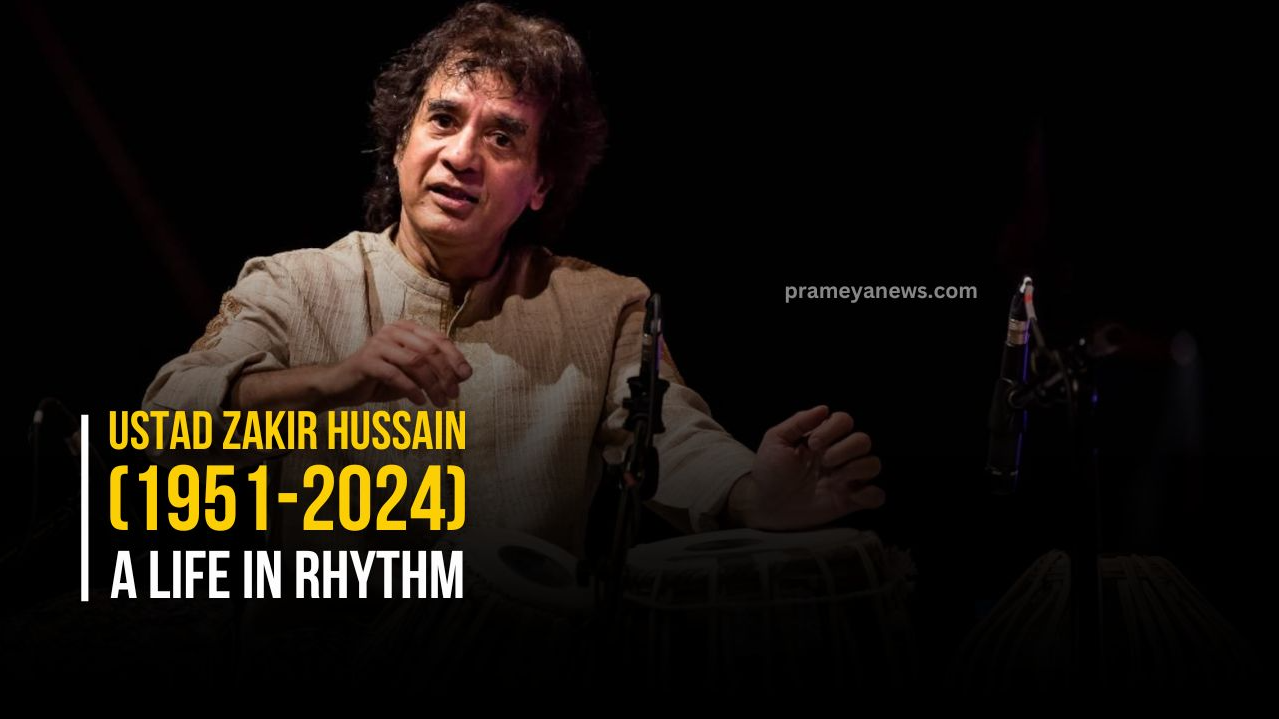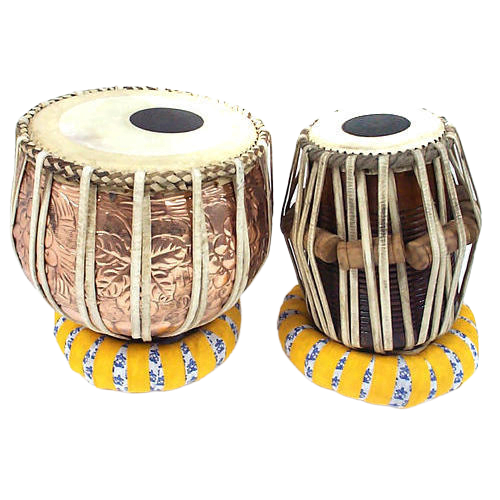

The world mourns the passing of Ustad Zakir Hussain, the legendary tabla maestro who left an indelible mark on the world of music. His death on December 15, 2024, at the age of 73, has left a void in the hearts of music lovers worldwide. Hussain was more than just a musician; he was a cultural ambassador, an innovator, and an inspiration to generations of artists. This article delves into the life and legacy of this remarkable individual, tracing his journey from a child prodigy to a global icon, exploring the cultural significance of the tabla in Indian music, and how Hussain's work helped popularize this instrument around the world.
Born in Mumbai, India on March 9, 1951, Zakir Hussain was destined for a life immersed in music. His father, Ustad Alla Rakha, was a renowned tabla player himself, and young Zakir's initiation into the world of rhythm began almost as soon as he was born. His father, instead of whispering a traditional prayer, chose to sing rhythmic syllables, known as tabla bols, into his ear. "My mother was very upset and said, 'Why are you doing this?' And he said, 'Because this is my prayer,'" Hussain recalled. This unique and symbolic "prayer" foreshadowed the path Zakir would take. Even as a toddler, Hussain's innate musicality was evident as he would instinctively gravitate towards his mother's pots and pans, using them as makeshift instruments. By the age of seven, he was already performing on stage under his father's tutelage, a testament to his prodigious talent and the rigorous training he received.
Hussain's early education was a blend of tradition and modernity. He attended St. Michael's High School and later graduated from St. Xavier's College in Mumbai. He also pursued his doctorate in music from the University of Washington, showcasing his commitment to both artistic and academic pursuits. His musical training, however, was deeply rooted in the traditional guru-shishya parampara (teacher-student tradition). He would wake up before dawn to practice with his father, immersing himself in the intricacies of tabla for hours before attending school. This dedication and discipline, instilled through the guru-shishya tradition, laid the foundation for his extraordinary career.
Hussain came from a large and musically inclined family. He had three brothers and three sisters. Two of his brothers, Taufiq Qureshi and Fazal Qureshi, also pursued careers in music as a percussionist and tabla player, respectively. Sadly, his brother Munawar passed away at a young age. While his father played a pivotal role in his musical development, Hussain also acknowledged his mother's significant contribution. She ensured that he and his siblings received a formal education, emphasizing the importance of communication skills, which proved invaluable for his career in the public eye.
Zakir Hussain's musical training was not just about technical proficiency; it was about understanding the very essence of rhythm. His father emphasized the importance of internalizing the language of tabla, of "speaking" the rhythms before even touching the instrument. "He'd speak the rhythms to me with expression," Hussain shared, explaining how this approach allowed him to form complex "phrases, sentences and paragraphs" in music. This fostered a deep connection between Hussain and his instrument, allowing him to improvise and express himself with unparalleled freedom and creativity.
Hussain's unique style was shaped by his rigorous practice routine and his father's innovative teaching methods. He was encouraged to explore different regional styles and techniques, to deconstruct and reconstruct rhythmic phrases, and to develop his own voice within the tradition. This led to a distinctive style characterized by both technical brilliance and artistic innovation. He was known for his ability to replicate a wide range of sounds on the tabla, from the rhythmic clip-clop of horses to the chugging of a railway train, adding a playful and captivating element to his performances.
Hussain's musical journey was also influenced by his exposure to Western music. He recalled seeing Duke Ellington perform live in 1962, an experience that left a lasting impression and contributed to his appreciation for jazz. He recognized the connection between Indian music and jazz, describing them as "cousins" due to their shared emphasis on improvisation and spontaneity. This understanding of different musical traditions would later become a defining characteristic of his collaborative work.
Zakir Hussain's career was marked by groundbreaking performances and collaborations that transcended musical boundaries. He was a master of both Indian classical music and jazz fusion, seamlessly blending these genres and creating a unique sound that captivated audiences worldwide. As a "chief architect of the contemporary world music movement," he played a pivotal role in popularizing Indian music globally and fostering cross-cultural musical dialogues.
Some of his most notable collaborations include:
Hussain also collaborated with a wide range of artists, including George Harrison, Yo-Yo Ma, Charles Lloyd, and many others. He even contributed to film soundtracks, composing music for Bollywood and other film industrie. An interesting anecdote from his collaboration with George Harrison reveals Hussain's initial desire to play the drum kit instead of the tabla. However, Harrison convinced him to stick to his roots, recognizing the unique contribution of the tabla to the music. These collaborations showcased his versatility and his ability to connect with musicians from different backgrounds, further solidifying his role as a bridge between musical worlds.
Beyond his individual collaborations, Hussain curated the "Zakir Hussain and Masters of Percussion" series, a platform that brought together renowned Indian and international percussionists to showcase diverse rhythm traditions. This initiative highlighted his dedication to promoting and preserving the rich heritage of percussion music.
As a teenager, Hussain toured with his father, accompanying Indian classical music legends like Pandit Ravi Shankar and Ustad Ali Akbar Khan. This early exposure to international audiences contributed to his understanding of the growing appreciation for Indian music in the West. He continued to tour extensively throughout his career, performing in prestigious venues and festivals worldwide.
Hussain's innovative spirit extended to his compositions as well. He composed three concertos, including the first-ever tabla concerto performed by an orchestra, premiered by the Symphony Orchestra of India in 2015. This groundbreaking work demonstrated his commitment to pushing the boundaries of tabla music and expanding its possibilities within a Western classical context.
Zakir Hussain's contributions to music have been widely recognized and celebrated. He was the recipient of numerous awards, including civilian honors, prestigious accolades from the Indian government, and Grammy Awards.
Award | Year |
Padma Shri | 1988 |
Padma Bhushan | 2002 |
Padma Vibhushan | 2023 |
Sangeet Natak Akademi Award | 1990 |
Fellowship of the Sangeet Natak Akademi | 2019 |
He won four Grammy Awards throughout his career:
In 2016, Hussain was invited to the White House by Barack Obama to attend the All-Star Global Concert, becoming the first Indian musician to receive this honor. This recognition further solidified his status as a global icon and cultural ambassador.
In addition to his performance and composition career, Zakir Hussain founded and served as president of Moment Records, an independent record label dedicated to presenting rare live concert recordings of Indian classical music and world music. This endeavor showcased his entrepreneurial spirit and his commitment to promoting and preserving diverse musical traditions.
Zakir Hussain's legacy extends far beyond his musical achievements. He was a true ambassador for Indian culture, introducing the world to the beauty and complexity of tabla playing. He broke down musical barriers, collaborating with artists from diverse genres and inspiring countless musicians around the globe.
The tabla, a pair of hand drums, holds a significant place in Indian classical music. It is the main percussion instrument, providing rhythmic accompaniment and serving as a foundation for melodic improvisation. Hussain's work elevated the instrument to new heights, expanding its expressive possibilities and showcasing its versatility in both traditional and contemporary contexts. He played a crucial role in bringing the tabla to the world stage, demonstrating its rich artistic potential and contributing to its global recognition.
Hussain was also a dedicated educator, conducting workshops and masterclasses to share his knowledge and passion with future generations of musicians. He held workshops at prestigious institutions like Princeton University and Stanford University, further disseminating his expertise and inspiring aspiring musicians.
Did you know that “Ustad Zakir Hussain's father, also a renowned tabla player, whispered tabla rhythms into his ear instead of prayers when he was born?”
Did you know that “Ustad Zakir Hussain was a chief architect of the world music movement, collaborating with artists like John McLaughlin, Mickey Hart, and George Harrison?”
Did you know that “Ustad Zakir Hussain was the first Indian musician invited to the White House by Barack Obama for the All-Star Global Concert?”
Ustad Zakir Hussain's life was a testament to the power of music to transcend boundaries and connect people. He was a master of his craft, an innovator, and a cultural icon. His music will continue to inspire and resonate with audiences for generations to come. His passing is a profound loss, but his legacy will live on through his recordings, his students, and the countless lives he touched with his music. He not only bridged the East and West through his music, but also redefined the role of the tabla in contemporary music, leaving an enduring impact on the world's musical landscape.
